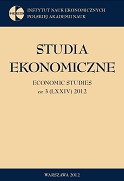Emerytury branżowe w Polsce w kontekście teorii grup interesu
Sectoral Pensions in Poland in the Context of Theory of Interest Groups
Author(s): Maciej J. GrodzickiSubject(s): Economy
Published by: Instytut Nauk Ekonomicznych Polskiej Akademii Nauk
Keywords: sectoral pensions; interest groups; system of interest representation,pension reform
Summary/Abstract: Four professional groups in Poland have separate pension schemes: (1) miners, (2) soldiers and policemen, (3) judges and prosecutors, and (4) farmers. So far,several attempts to reform sectoral pensions were undertaken, yet all of them proved to be unsuccessful. The paper aims to describe four sectoral pension systems, with special emphasis on their genesis and social functionality. Furthermore,it attempts to explain an extraordinary effectiveness of sectoral interest groups in striving for pension privileges. The analysis is based on the categories of theory of interest groups, and supported by media publications and statistical data. It shows that at present sectoral pension schemes cover over 1,5M pensioners and their annual cost for the central budget exceeds 2,0% of Polish GDP. They provide, in numerous ways, privileged conditions for their members. At he same time they are dysfunctional for development of the economy and society, and also for their very sectors. It is found that prolonged subsistence of the privileges was possible due to some specific characteristics of the Polish system of interest representation. Its most powerful actors are the sectoral trade unions, interested in implicit income redistribution. On the other hand, there are no large, strong groups supporting general social interest. Moreover, sectoral privileges are fostered by the systemic dualism in Poland, consisting in employees’ organizations in the state sector being politically much stronger than their counterparts in the private sector.
Journal: Studia Ekonomiczne
- Issue Year: 2012
- Issue No: 3
- Page Range: 345-370
- Page Count: 26
- Language: Polish

